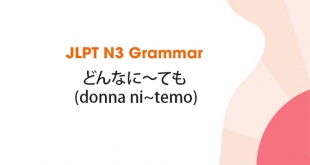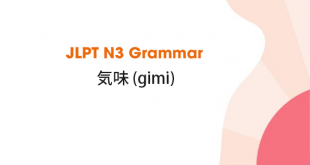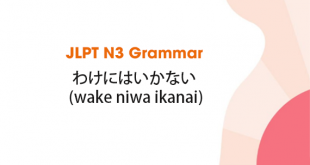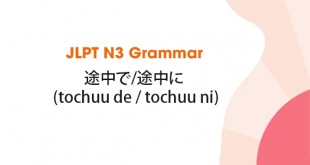Learn JLPT N3 Grammar: ようとする (you to suru) Meaning: try to; attempt to; be about to ~ How to use: Verb (volitional form) + とする / とした/ としたら Example sentences: 1. うるさい子供たちに物事を説明しようとするとき、いら立ちを感じる。 urusai kodomotachi ni monogoto o setsumei shiyou to suru toki, iradachi o kanjiru. I feel frustration when trying …
Read More »JLPT N3 grammar
Learn JLPT N3 Grammar: おかげで (okage de)
Learn JLPT N3 Grammar: おかげで (okage de) Meaning: thanks to; owing to; because of ~ How to use: Verb (casual) + おかげで Noun + のおかげで な-adjective + なおかげで い-adjective + おかげで Example sentences: 1. わたしは多忙なおかげで、悩んだりする暇がない。 watashi wa tabou na okage de, nayandari suru hima ga nai. I am so busy …
Read More »Learn JLPT N3 Grammar: がたい (gatai)
Learn JLPT N3 Grammar: がたい (gatai) Meaning: very difficult to; hard to ~ How to use: Verb ます (stem form) + がたい Example sentences: 1. 彼の話は信じがたい内容でした。 kare no hanashi wa shinji gatai naiyou deshita. His story’s contents were impossible to believe. 2. 子どもに対する犯罪は許しがたい。 kodomo ni tai suru hanzai wa yurushi …
Read More »Learn JLPT N3 Grammar: どんなに~ても (donna ni~temo)
Learn JLPT N3 Grammar: どんなに~ても (donna ni~temo) Meaning: no matter how (much) How to use: どんなに + Verb (ても form) どんなに + Noun + でも どんなに + な-adjective + でも どんなに + い-adjective + いくても Example sentences: 1. どんなに暑くても寝る時はクーラーを消して寝る。 donna ni atsukutemo neru toki wa kuuraa o keshite neru. No …
Read More »JLPT N3 Grammar: 気味 (gimi)
JLPT N3 Grammar: 気味 (gimi) Meaning: -like; -looking; -looked; tending to ~ How to use: Verb ます (stem form) + 気味/ ぎみ Noun + 気味/ ぎみ Example sentences: 1. 昨夜、彼は風邪気味だった。 sakuya, kare wa kaze gimi datta. He had a bit of a cold last night. 2. 新入社員は緊張気味の顔をしています。 shinnyuu shain wa …
Read More »JLPT N3 Grammar: ふりをする (furi o suru)
JLPT N3 Grammar: ふりをする (furi o suru) Meaning: to pretend; to act as if ~ How to use: Verb (casual) + ふりをする Noun + の + ふりをする な-adjective + な + ふりをする い-adjective + ふりをする Example sentences: 1. バカのふりをするのは友達の前だけにしておけ。 baka no furi o suru no wa tomodachi no mae dake …
Read More »Learn JLPT N3 Grammar: 向き (muki)
Learn JLPT N3 Grammar: 向き (muki) Meaning: suitable for ~ How to use: Noun + 向き/ むき Example sentences: 1. こういう本は若い読者向きではない。 kouiu hon wa wakai dokusha uki dewa nai. These kinds of books are not suitable for young readers. 2. 留学生向きの大学案内書が刊行された。 ryuugakusei muki no daigaku annaisho ga kankou sareta. A …
Read More »JLPT N3 Grammar: わけにはいかない (wake niwa ikanai)
Learn JLPT N3 Grammar: わけにはいかない (wake niwa ikanai) Meaning 1: must not, cannot afford to, can’t very well Meaning 2: must, have no choice but to How to use: Verb (casual, non-past) + わけにはいかない Verb (ない form) + わけにはいかない Example sentences: 1. あとで車を運転するので、今お酒を飲むわけにはいきません。 ato de kuruma o unten suru node, …
Read More »JLPT N3 Grammar: 途中で/途中に (tochuu de / tochuu ni)
Learn JLPT N3 Grammar: 途中で/途中に (tochuu de / tochuu ni) Meaning: midway; on the way; in the middle of ~ How to use: Verb (dictionary form) + 途中で/ 途中に Noun + の + 途中で/ 途中に Example sentences: 1. 私は駅から学校に行く途中で先生に会った。 watashi wa eki kara gakkou ni iku tochuu de sensei ni …
Read More »Learn JLPT N3 Grammar: とおりに (toori ni)
Learn JLPT N3 Grammar: とおりに (toori ni) Meaning: in the same way as; in the way; as ~ How to use: Verb (dictionary form) + とおりに Verb (casual past) + とおりに Noun + どおりに/ のとおりに Example sentences: 1. 昨日勧めたとおりにやってみましたか? kinou susumeta toori ni yatte mimashita ka. Did you do what …
Read More » Nihongo Nihongo
Nihongo Nihongo










